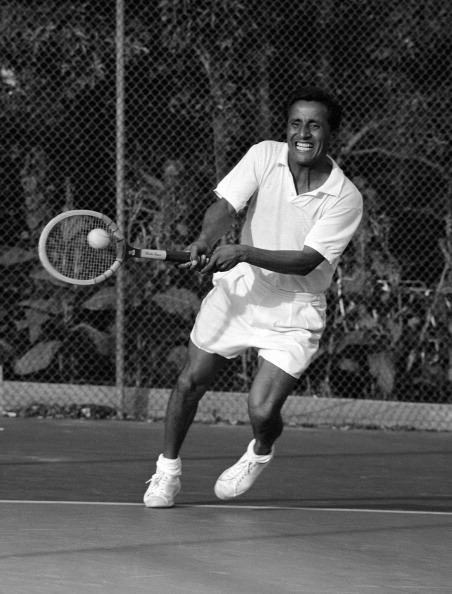By Pancho Segura
The following appeared in the November 1963 edition of World Tennis magazine.
The difference between a practice and a tournament match is “pressure.” There is no way to simulate competitive play and the only way to get tournament experience is simply by entering as many tournaments as possible and learning from one’s errors. There is not enough tension in practice and therefore the development of a player will be limited if he cannot compete against others under tournament conditions.
Tension produces fatigue. A player in good condition may get exhausted in the third game of the first set of a tournament match. Top players therefore try to avoid pre-match exertions which do not pay off. They may practice hard in the morning or have a hit just before playing but they do not sit in the sun, do gymnastics, swim or drive until after the match is over.
Each player is an individual and each will have his own method of training which is best for him. However, none will change their routine just before a tournament. If a player regularly goes to bed at 11:00, he should not suddenly go to bed at 9:00. If he eats lightly before playing he should not switch to heavy meals when he enters a tournament. The one addition to his routine is salt pills since players are susceptible to cramp because of match strain.
A good competitor goes into a match with a plan. He does not change it after he loses one point or one game. He does not stick to it if he has been badly beaten in the first set. It is good to be flexible. To play more aggressively on a fast court, to serve short and wide against a receiver who plays too far back, to lob more against a player with the shaky overhead, to play steadily on a slow court but to switch to another tactic if the plan is not succeeding.
The mental attitude of the match player is a function of his own personality. He needs confidence in his own game but respect for his opponents abilities as well. The unconfident player will tighten on his strokes or will resort to retrieving or overhitting as a desperation measure. The overconfident player expects his opponents to fall over as soon as he steps on the court.
The temperament of a player can win or lose for him if he cannot control his anger when he errs on a big point, the match with slip away from him. Anger against an opponent can be just as hazardous. If one expects misbehavior or mistakes on the part of the opposition, the crowd and the occasional linesman, one is only pleasantly surprised if all goes well. The old tournament hand is not upset by stalling or any of the other gambits of gamesmanship whose object is to make him lose control. He takes the calls as they come and he does not fly into a tantrum when a linesman or umpire proves to be fallible. He is too good a competitor to let a partisan crowd get under his skin. He welcomes the opportunity of demonstrating his skill and his poise under the worst of circumstances. However he sticks to his guns when it is a question of the rules.
Among the “don’ts” of competitive play: don’t listen to advice from well-wishers, don’t gulp water on the odd games (sip it!), don’t worry about lost points, don’t run for a ball that is going out(it is the mark of a rabbit), don’t think of what you will say to your opponent after you have won, don’t count the gallery, don’t let extraneous thoughts come into your mind and don’t rush yourself out of the match.
Among the “dos” when the nervous strain is great try deep breathing, when fatigue overwhelms you stay on your toes, when your strokes fail you go back to fundamentals, when you are down two sets to one and are playing badly take the intermission and when you win or lose the match be gracious.

